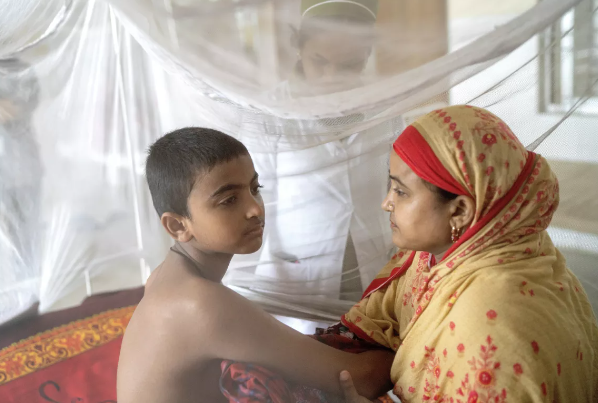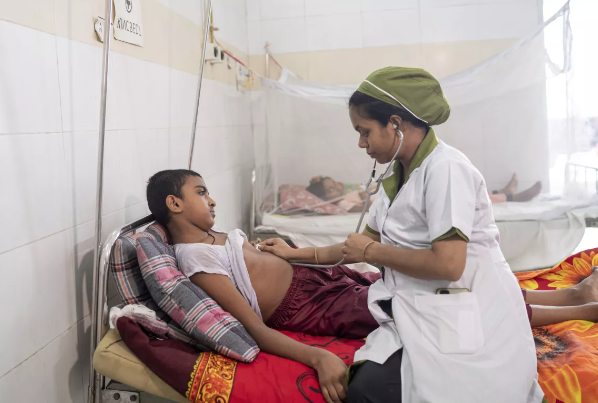As the dengue outbreak continues to grip Bangladesh, it poses a severe public health challenge, impacting children and communities across the nation. The global challenge of changing climatic conditions and increasing global warming further exacerbate the spread of vector-borne diseases like dengue, particularly in countries at risk.
Fahim lays on the bed next to his mother, as nurses tend to his fever brought on by dengue. He has had this fever for the last nine days.
Eleven-year-old Fahim is a diligent student at a local religious school, who contracted dengue when stagnant pools of water near the school served as a breeding ground for disease-carrying mosquitoes.
As his condition worsened, Fahim's worried mother Jesmin recognised the symptoms and brought him to Shaheed Ahsanullah Master General Hospital in Tongi, Gazipur, where medical staff and nurses attended to him and gave him the necessary treatment.
"Fahim’s condition is improving, but I wish we could have gotten him admitted quicker. The queues are too long due to so many patients getting admitted with dengue." Jesmin says as she checks her son’s temperature with her hand.
It hurts my entire body. It’s difficult to move or do things in this state.
Fahim, 11-year-old student

An escalating crisis
29 per cent
of the reported cases of dengue are children, emphasizing their vulnerability to the disease.
As the dengue outbreak continues to grip Bangladesh, it poses a severe public health challenge, impacting children and communities across the nation. The global challenge of changing climatic conditions and increasing global warming further exacerbate the spread of vector-borne diseases like dengue, particularly in countries at risk.
According to data from the Directorate General of Health Services (DGHS), since January 2023, almost forty-five thousand cases of dengue have been reported in Bangladesh, with more than two hundred fatalities. Both these numbers continue to rise at an alarming rate as the outbreak spreads to all 64 districts in the country, posing a significant threat to children.
Protecting communities through prevention

The hospital Fahim has been admitted to has become a crucial hub in Tongi for providing medical care and support to dengue patients - an important part of which is creating awareness in them and their families regarding preventing and mitigating dengue in their respective communities.
As part of our daily practice, we try to advise and follow up with patients on how they can take care to prevent dengue in their neighbourhoods and what they can do to reduce its spread.
Dr. Mohammad Tarik Hasan, Residential Medical Officer at the hospital
Cooperation for change
Fahim's battle against dengue reflects the collective urgency and need to address the situation across Bangladesh. UNICEF is fully committed to collaborating with the Government of Bangladesh and other partners to effectively respond to the dengue outbreak and work together to mitigate its impact on vulnerable communities, particularly children. The fight against dengue is a united effort, where we all play a crucial role together in breaking the chain of transmission and ensuring a safer and healthier future for all.